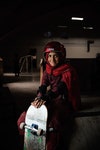Each time Carol Dysinger turns her chair to pause for reflection, a glint of gold bounces off her Oscar statuette stowed on a low shelf behind
What does skateboarding teach girls in Afghanistan?
It gives them a chance not to be dependent on someone else. They learn how to be with each other, which is rare because girls play with their cousins or maybe their neighbours. They don’t have friends the way we have friends in the West. And skateboarding is fun. It’s like riding a bike, which is something they’re not allowed to do.
What are their prospects?
They’re mostly poor kids who don’t start school at the appropriate age. Skateistan takes them from first to third grade in one year. The fact that they can read, write and do stunts, and have some training in the Koran, means they’re much more valuable, so they’re a lot safer. And if they get married to an old husband, they’re going to become widows young, but they have the ability to prepare themselves.
© Kiana Hayeri
Are there any signs of change?
Many young people have been able to go to school, and importantly they have phones. What’s different is that the new generations know more about the world. The Taliban are going to have a hard time putting that genie back in the bottle. In the past, people wanted safety and protection from all this crazy corruption and civil war. But now, hopefully young people will have the education system to resist them. Let’s keep hoping.
You’ve been to Afghanistan many times. As a woman, how were you treated?
Anybody walking down the street could tell I was a Westerner, even with my headscarf and abaya. And if you’re a Western woman, it means you’re working with the government, or something similar, so you’re sort of a third gender. You’re treated kind of like a man, but not entirely. You’re not rejected, though.
Have you ever felt in danger on the streets of Kabul?
In a place like that, you learn very quickly that fear is an emotion and danger is a situation. And they often don’t have anything to do with each other. You know, sometimes when you’re the most relaxed, it’s probably when you’re about to get into trouble. There were times I was in danger, but nine times out of ten I didn’t know until it was over.
Why did a film about such an indecipherable world win an Oscar?
Because it lets people know that there’s always hope. Those girls are there, and they’re living their lives despite everything. In skateboarding they didn’t just find a way to play. They found their own movement.
An 11 year-old student and a 9 year-old student. 90% of students at Skateistan
in Kabul come from low-income backgrounds. They have limited opportunities to participate in sports and many are not attending school.
PHOTOGRAPHS BY KIANA HAYERI.

